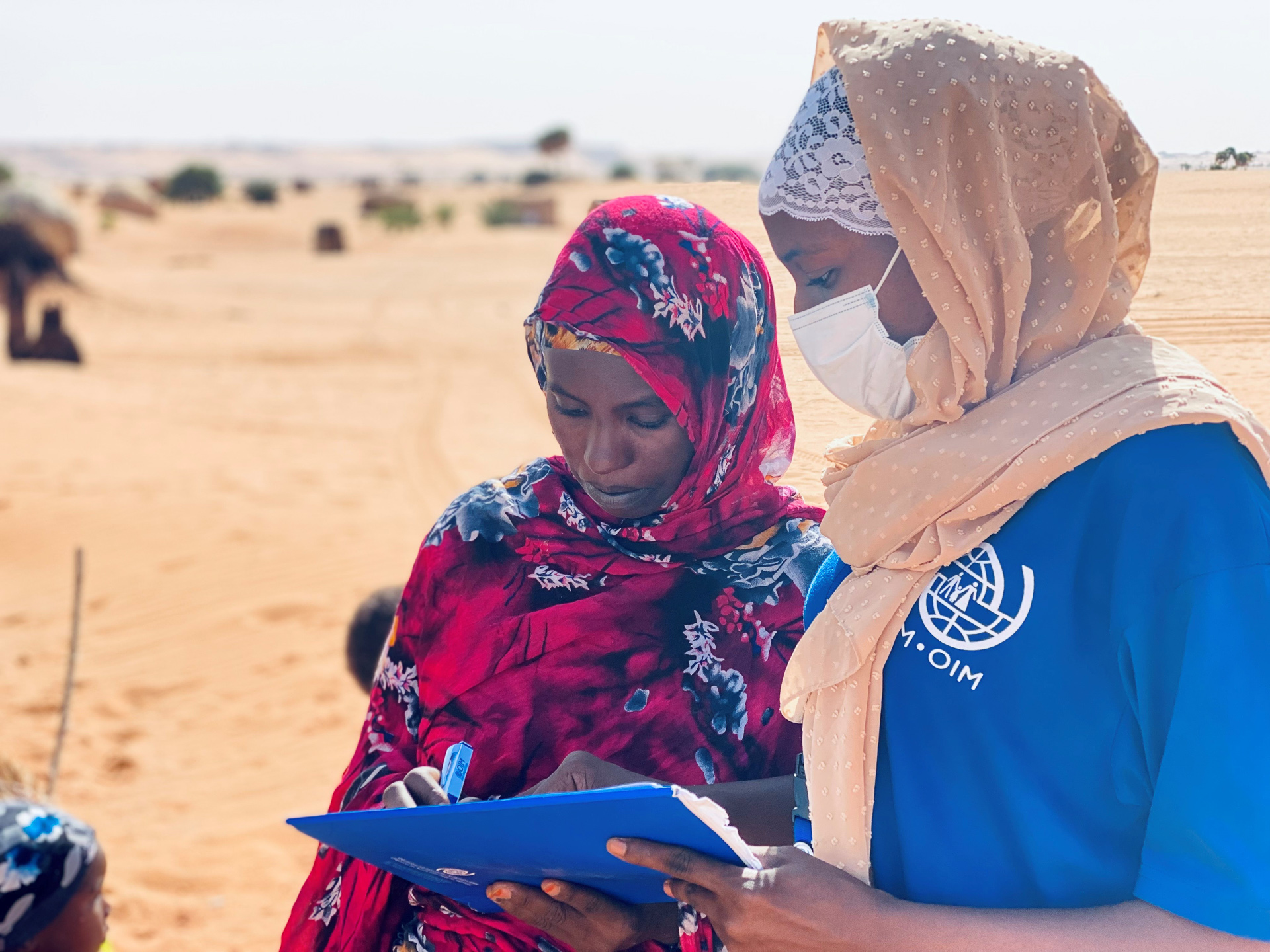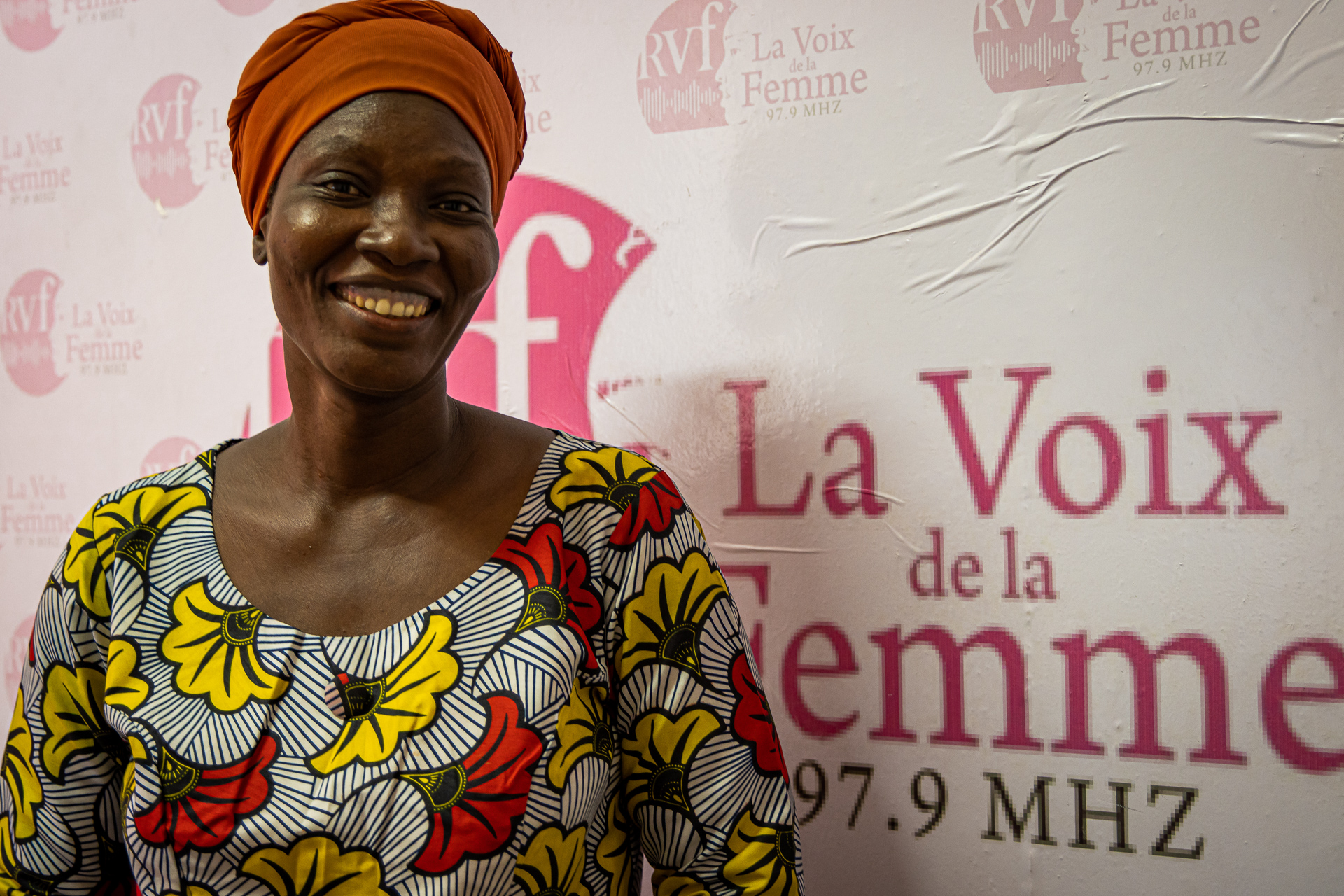Chad, 19 August 2022 – Over 1 million people are forcibly displaced due to insecurity and climate change in Chad.
The International Organization for Migration (IOM) is one of the leading organizations providing lifesaving humanitarian and development support, and protection to vulnerable migrants across the vast, landlocked country in north-central Africa.
But we do not do it alone; we rely heavily on our partners.
On this World Humanitarian Day 2022, the spotlight is on IOM staff and partners who, in one way or another, contribute to making migration safe and dignified for the benefit of all.
Seven humanitarians, seven stories, seven examples of people helping people.
Their stories represent only a fraction of the thousands of humanitarians around the world, and serve as proof that where people are in need, there are others reaching out to help.

Haoua, Project Assistant (Migrant Protection and Assistance), IOM Chad Photo: IOM 2022
Haoua, Project Assistant (Migrant Protection and Assistance), IOM Chad
“I have worked with IOM Chad since 2018 and I am based in Faya, in the North of the country where I support migrant protection and assistance activities.
“My job includes coordinating with authorities and service providers to ensure vulnerable migrants have access to assistance such as food, shelter, water, and medical support, including those who are in the transit centre. I also work with our N’djamena team to facilitate the voluntary return of people to their countries of origin.
“I organize awareness sessions, but I also intervene when migrants are stranded in the desert and give them emergency assistance.
“As a human being, I am proud to help people in distress. Sometimes people do not know where to go and don’t have anything to eat. But now, they can call me anytime and I answer. This job is a choice and even when I will no longer work for IOM, I will continue to help others in one way or another.”

Sonia, Journalist, Radio Voix de la Femme. Photo: IOM/Adeline Tannone 2022
Sonia, Journalist, Radio Voix de la Femme
“My name is Sonia Begredo and I am the Coordinator at Radio Voix de la Femme. I am responsible for all technical aspects, as well as production and scripting of the radio shows.
“As part of our activities, we produce programmes on women's empowerment to inspire women, to help them start small businesses and become more independent.
“A humanitarian is one who is at the service of others, and we, at the radio station, are in a way humanitarians since we create programs that contribute to the personal and professional well-being of our listeners.
“We produce a lot of programmes with IOM to talk about the benefits of migration but also to raise awareness about the dangers of irregular migration. We give our listeners the opportunity to fully understand how migration contributes to the development of the country.
“I take a lot of pride in knowing that a foreigner who comes to Chad doesn’t feel out of place. It means the messages we share are not in vain.”

Issakha, Driver, IOM Chad. Photo : IOM/François-Xavier Ada 2022
Issakha, Driver, IOM Chad
“I am Issakha Mahamat Haroun. I joined the IOM family on 2 September 2010.
“What I like are the regular missions to the Sahara, sometimes even to Libya, to help migrants in distress. I remember in Libya in 2012, we met many victims of the Libyan crisis. It was a long mission of 2 months and 10 days, after which we organized the voluntary return of nearly 100,000 people, including Chadians and non-Chadians.
“This work, helping people affected by crisis and in need, is a vocation for me. I take pride in helping people regain their dignity.”

Protège, Artist (painter/poet). Photo : IOM/François-Xavier Ada 2022
Protège, Artist (painter/poet)
“I am a painter and slam artist. From a young age, I was passionate about writing and sharing my texts with others. This led me to embrace slam poetry.
“Asking me why I write and do slam poetry is like asking me why I get up every day. For me, slam poetry is a way of life and a powerful means of communication.
“Seeing how migrants, including my brothers and sisters, are sometimes treated around the world breaks my heart. So, through my art, I also share messages about migration. I remind people that there is nothing wrong with people trying to migrate, that we should reach out to each other.
“If, through my texts, I manage to evoke emotions about those most vulnerable, my audience may want to bring assistance to these people.
“That is how I contribute to saving lives, every day.”
*Protège is one of 15 youths who participated in IOM’s slam poetry competition on migration and social cohesion in June 2022.

Salla, Community Leader. Photo: IOM/Anne K. Schaefer 2022
Salla, Community Leader
“My name is Salla Yangorum and I live in Nguelia, a small canton which hosts internally displaced persons (IDPs) in the Lac province. For the last 20 years, I have trained young women in the art of making traditional noodles. I believe it is important for women to be autonomous because it is the only way to be truly free.
“Most of the IDPs who arrive here were farmers in their home communities. They used to grow wheat and peanuts but lost everything when they had to flee. Giving them a possibility to now learn something new is an opportunity for them to build a new life here in our new joint home.
“I don’t think I am a humanitarian worker, but I love being able to share what I know with people who can appreciate this traditional craft. How can I be a humanitarian worker when I benefit myself from this exchange?”

Bénédicte, Cleaner, IOM Chad. Photo : IOM/François-Xavier Ada 2022
Bénédicte, Cleaner, IOM Chad
“I have been a cleaner at IOM since 2019. I am responsible for ensuring everyone has a clean and healthy working environment. I also sometimes organize catering for meetings held at the office.
“Often, when returning migrants come to the office for counselling sessions, I offer them refreshments and sometimes I give cakes to the little ones. These small gestures help them regain confidence in themselves and trust IOM.
“For me, everyone can be a humanitarian with their work because everything we do well contributes to the happiness of others.”

Oumar, Logistics Support Assistant, IOM Chad. Photo : IOM/François-Xavier Ada 2022
Oumar, Logistics Support Assistant, IOM Chad
“I joined the IOM Displacement Tracking Matrix (DTM) team in Baga Sola in May 2015 right after my studies. It was very exciting work because we are in direct contact with beneficiaries. This enables us to know their real needs and devise appropriate responses. It has been an enriching experience for me so far because I see the reality on the ground, and it motivates me to continue.
“Helping someone, assisting them in their time of greatest need, is akin to saving their lives and that's why I love this job. We don't even need to see the material side of things. The priority is to help people.
“This year, I have joined the logistics unit to strengthen the delivery of this precious aid to people.”


